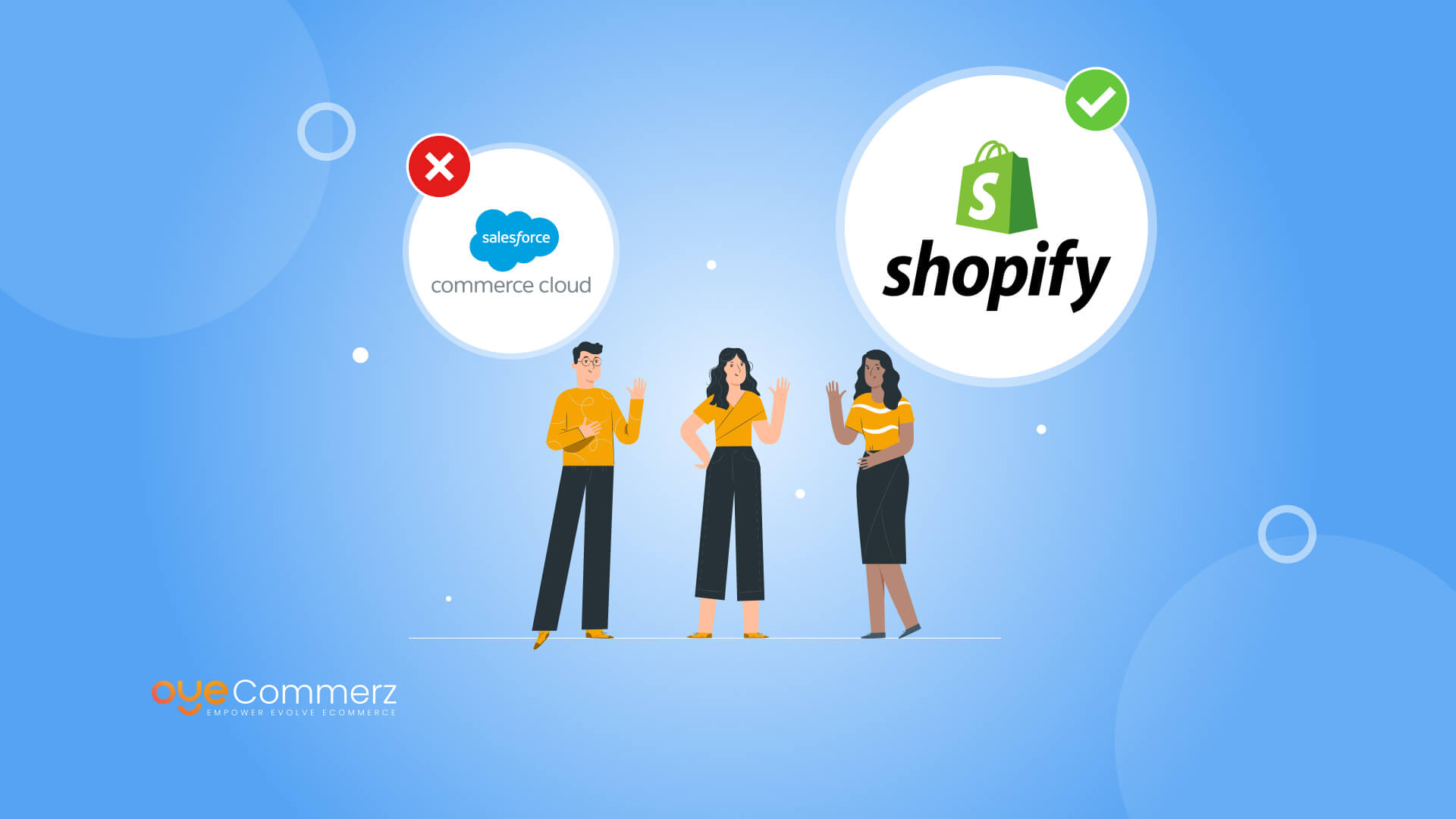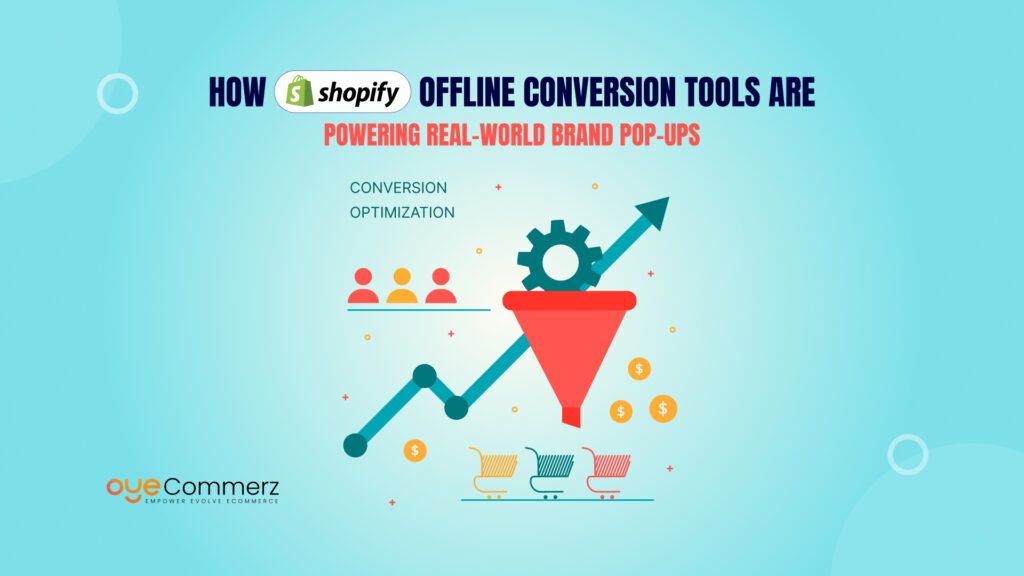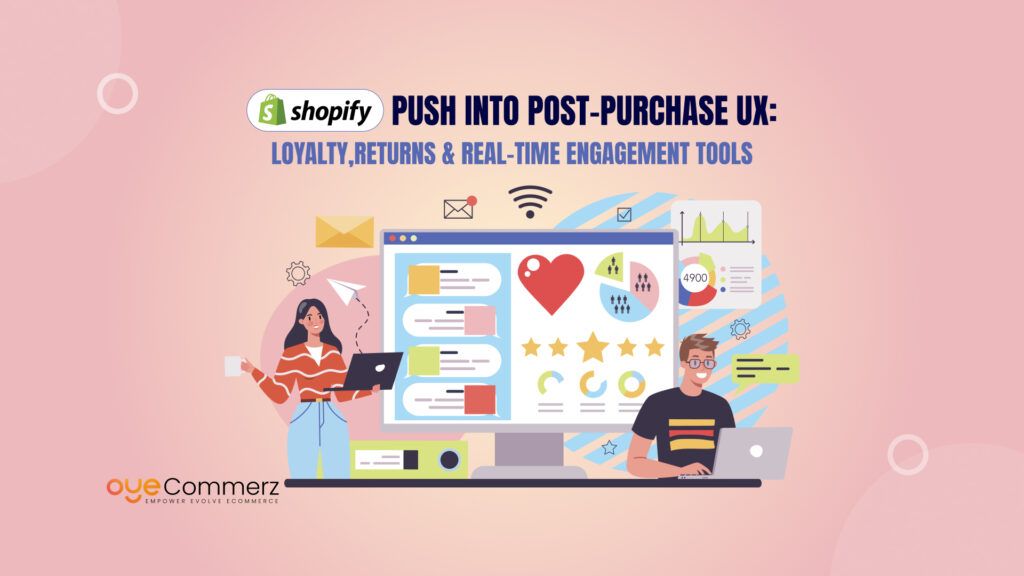Is Salesforce Commerce Cloud really better than Shopify for your business? If you’re an existing Shopify business owner, you might be wondering if switching to Salesforce Commerce Cloud is worth it. Let’s break it down together no jargon, just real talk.
Shopify’s ease of use, cost-effectiveness, and massive app ecosystem (including app development options) make it a powerful choice. In fact, businesses using Shopify see up to 30% faster launch times compared to enterprise-heavy platforms like Salesforce Commerce Cloud.
So, should you stay with Shopify or make a move? Let’s dive in!
Shopify vs. Salesforce Commerce Cloud: A Quick overview
Shopify is an affordable, user-friendly eCommerce platform ideal for businesses of all sizes. It offers easy setup, scalability, and an extensive app ecosystem, making it perfect for entrepreneurs and small to mid-sized businesses. Shopify handles hosting, maintenance, and security, allowing you to focus on growing your business without technical complexity.
Salesforce Commerce Cloud is a more complex, enterprise-level platform, designed for large-scale businesses with advanced customization needs. It integrates seamlessly with other Salesforce products but requires technical expertise and comes with higher costs. It’s suited for businesses needing extensive personalization and advanced features.
In short, Shopify is ideal for businesses looking for simplicity, scalability, and affordability, while Salesforce Commerce Cloud suits large enterprises needing deep customization and advanced features.
Why Choose Shopify Over Salesforce Commerce Cloud?
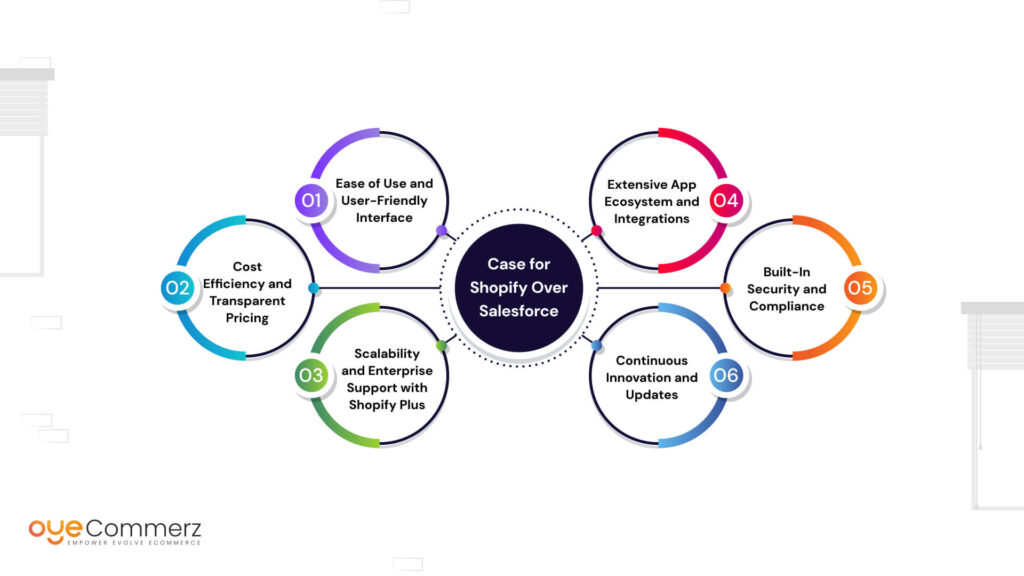
1. Ease of Use and User-Friendly Interface
One of the standout advantages of Shopify over Salesforce Commerce Cloud is its simplicity and ease of use. Shopify’s intuitive dashboard allows non-technical users to manage and update their stores without requiring a development team. With Salesforce Commerce Cloud, extensive coding knowledge and technical expertise are often needed, leading to higher operational costs and dependency on developers.
For businesses that prioritize a straightforward platform where store managers and marketers can easily make changes, Shopify wins hands down. Its drag-and-drop interface, pre-built templates, and user-friendly customization options allow businesses to focus on scaling their operations instead of getting bogged down by technical challenges.
Additionally, Shopify’s admin panel is designed to simplify everyday tasks, such as inventory management, order processing, and customer interactions. According to Shopify, over 4 million e-commerce websites are using the platform as of 2023, underscoring its widespread appeal across industries.
2. Cost Efficiency and Transparent Pricing
Cost-efficiency plays a significant role in platform selection, especially for enterprises that are conscious of their operational budgets. Shopify offers transparent pricing, which allows businesses to predict their monthly costs without the hidden fees often associated with Salesforce Commerce Cloud.
Salesforce Commerce Cloud operates on a revenue-based pricing model, where costs can scale dramatically as your business grows, particularly with custom features and third-party integrations. On the other hand, Shopify’s subscription-based pricing is more predictable, with flat monthly fees starting at $29 for basic plans and ranging up to $2,000 for Shopify Plus, depending on the specific needs of large-scale businesses.
Shopify also includes hosting, security, and software updates within its pricing model, while Salesforce Commerce Cloud often requires additional investment in development resources to manage these tasks. This predictability helps businesses keep their operating expenses under control while focusing on growth.
3. Scalability and Enterprise Support with Shopify Plus
When it comes to scalability, both Salesforce Commerce Cloud and Shopify offer solutions for large businesses, but Shopify Plus stands out for its ease of expansion and ability to handle significant growth without a complex development process. Shopify Plus is designed to support high-volume merchants, offering features like unlimited bandwidth, 99.98% uptime, and multi-channel selling across platforms like Facebook, Instagram, and Amazon.
For enterprises looking to scale their e-commerce business, Shopify Plus provides a streamlined approach with built-in enterprise-level features such as:
- Customizable checkout for improved conversions
- Advanced API access for third-party integrations
- Dedicated support and migration assistance
- Shopify Flow for workflow automation
In contrast, Salesforce Commerce Cloud requires more extensive custom development to achieve the same level of automation and flexibility. The simplicity of scaling with Shopify, combined with lower technical demands, makes it the preferred choice for enterprises looking to expand quickly and efficiently.
4. Extensive App Ecosystem and Integrations
Shopify’s app ecosystem is one of its most significant advantages over Salesforce Commerce Cloud. Shopify boasts over 7,000 apps in its App Store, ranging from marketing automation tools to inventory management and analytics integrations. These apps are designed to plug into the Shopify platform seamlessly, allowing businesses to quickly add new functionality without needing custom development.
Salesforce Commerce Cloud also supports integrations but often requires significant customization and developer resources to connect third-party apps. While this level of customization can be beneficial for companies with highly specific needs, it often leads to higher development costs and longer timelines.
Shopify’s app ecosystem, combined with built-in integrations with popular tools like MailChimp, Google Analytics, and Facebook, enables businesses to grow more rapidly and respond to market demands without the need for time-consuming development projects.
5. Built-In Security and Compliance
Security is non-negotiable in e-commerce, and both Salesforce Commerce Cloud and Shopify provide robust security features. However, Shopify takes the complexity out of security management by offering built-in hosting, SSL certificates, and PCI compliance across all plans. Businesses can rest assured knowing that their customer data is secure without needing to manage third-party hosting services or security updates.
Salesforce Commerce Cloud, while secure, often requires additional oversight from IT teams to manage these elements, particularly with third-party integrations or custom solutions. Shopify’s out-of-the-box security features save enterprises time, money, and the headache of managing security on their own.
6. Continuous Innovation and Updates
Another compelling reason why businesses choose Shopify over Salesforce Commerce Cloud is Shopify’s continuous innovation and release of new features. Shopify rolls out regular updates without interrupting service, ensuring that its merchants always have access to the latest tools and capabilities.
Salesforce Commerce Cloud does provide updates, but often requires a development team to implement and test new features, which can slow down the process. Shopify’s seamless updates, paired with its commitment to innovation, allow businesses to stay competitive without needing to dedicate internal resources to managing upgrades.
Migrate from Salesforce Commerce Cloud to Shopify
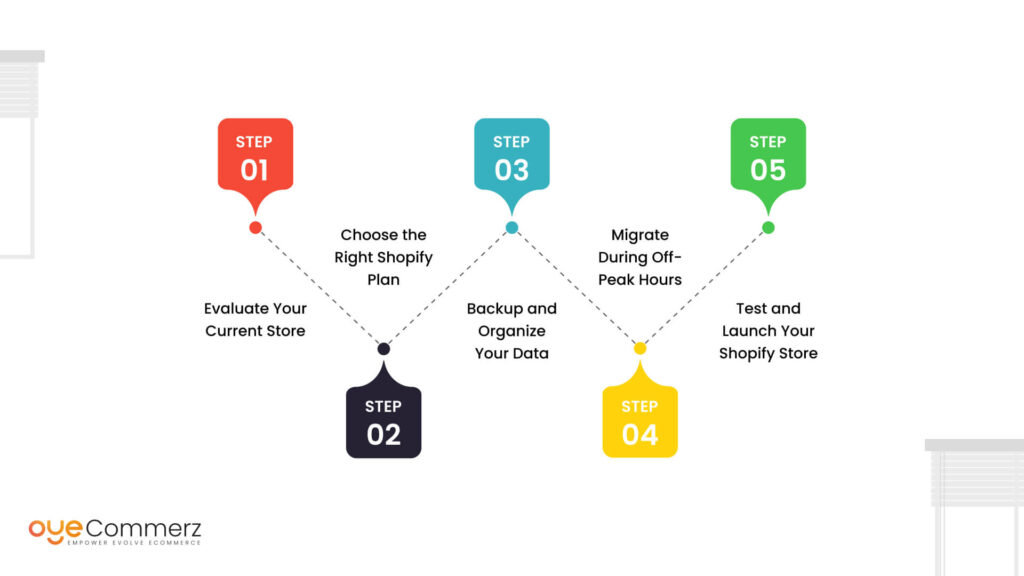
Making the switch from Salesforce Commerce Cloud to Shopify is a significant undertaking but can be managed smoothly with the right approach. Here are the steps to ensure a successful transition:
Step 1: Evaluate Your Current Store
Before initiating the migration process, conduct a full audit of your Salesforce Commerce Cloud store. Identify the key features, product catalogs, customer data, and integrations you will need to carry over to Shopify. This audit will help you determine which elements can be rebuilt or improved upon in your new Shopify store.
Step 2: Choose the Right Shopify Plan
Depending on the size and scope of your business, selecting the right Shopify plan is critical. For enterprises, Shopify Plus is typically the best option, offering advanced features, higher transaction limits, and dedicated support. Be sure to assess both your current needs and future growth to select the most appropriate plan.
Step 3: Backup and Organize Your Data
Backing up all data is crucial before beginning the migration process. This includes product information, customer records, order history, and content pages. Ensure all critical data is properly organized and any outdated or unnecessary data is purged to prevent clutter during the migration.
Step 4: Migrate During Off-Peak Hours
To minimize disruptions to your business, schedule the migration during off-peak hours or slower sales periods. This will allow for a smoother transition without affecting your bottom line.
Step 5: Test and Launch Your Shopify Store
Once the migration is complete, thoroughly test your new Shopify store to ensure all data has transferred correctly, product pages are functioning as expected, and your payment gateways are operational. Testing the checkout process and performing test purchases will help ensure your customers experience a seamless transition.
Ready to Make the Switch to Shopify? Let OyeCommerz Lead the Way!
Still wondering if Shopify is the right choice over Salesforce Commerce Cloud? At OyeCommerz, we’ve helped countless businesses—small and large—make successful transitions to Shopify and Shopify Plus. Our skilled team specializes in building scalable, high-performing e-commerce stores that drive growth. From seamless data migration and custom integrations to optimizing your store for a flawless user experience, we handle it all with precision.
Whether you need expert assistance in moving platforms or want to unlock the full potential of Shopify Plus, we’re here to make your journey smooth and effective. Let’s build a Shopify store that elevates your brand and grows your business.
Contact OyeCommerz for a free consultation today and start building your future on Shopify!
Contact to Migrate your Site to Shopify Now
Conclusion
Ultimately, Shopify’s ease of use, scalability, cost-efficiency, and robust ecosystem of apps and integrations make it the superior choice for businesses looking to grow their e-commerce operations quickly and efficiently. Salesforce Commerce Cloud offers powerful customization, but the higher costs, technical complexity, and longer timelines make it less appealing for enterprises that prioritize agility and scalability.
Choosing Shopify over Salesforce Commerce Cloud allows businesses to focus on what matters most: growing their brand, increasing sales, and delivering a better customer experience. With Shopify’s built-in features, transparent pricing, and continuous innovation, it’s clear why more and more enterprises are making the switch.
For companies ready to migrate, Shopify’s flexible platform offers the tools and support needed to make the transition as smooth and painless as possible. Reach out to Oyecommerz today to begin your migration and set your business up for long-term success.
Frequently Asked Questions
Yes! Shopify is more cost-effective, user-friendly, and requires less technical expertise compared to Salesforce Commerce Cloud. It also offers app development flexibility and a vast ecosystem of integrations.
Shopify is known for its ease of use, affordability, and scalability, while Salesforce Commerce Cloud is enterprise-focused with complex customization. Shopify also offers seamless app development and faster setup.
Yes! With Shopify’s extensive app development options, themes, and APIs, businesses can customize their store without high development costs, unlike Salesforce Commerce Cloud.
Shopify offers lower upfront costs, predictable pricing, and affordable transaction fees, making it a better choice for businesses of all sizes. Salesforce Commerce Cloud has higher enterprise-level pricing.
Absolutely! Shopify Plus is designed for high-growth businesses, offering enterprise-level scalability, automation, and advanced app development options without the complexity of Salesforce.
Businesses choose Shopify because of its user-friendly interface, lower costs, vast app ecosystem, and quick deployment, making it a smarter choice over Salesforce Commerce Cloud.

